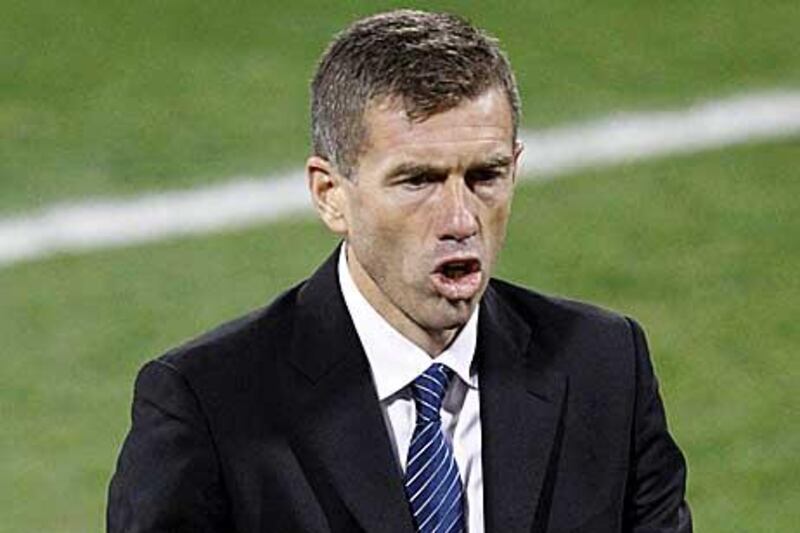The future of Srecko Katanec will be up for discussion when the Football Association's technical committee meets over the coming days to review the team's disappointing performance in the Asia Cup.
The UAE finished bottom of Group D with one point and no goals, placing the position of the coach under scrutiny.
But Mohammed al Rumaithi, the president of the FA, retains faith in the Slovenian and indicated that Katanec may lead the team in the 2014 World Cup qualifiers that will begin mid-year.
"We were satisfied with the work of Katanec so far," al Rumaithi told reporters. "The technical committee will have a meeting to review the performance of the team, but we are convinced that the man has worked hard and did his best.
"In the past, we have had a new manager every six or nine months, and we do not want to return to those days; it has hurt our team more than benefited us. So we want stability around the team, which is the best way going forward."
In 23 matches under Katanec, the UAE have nine wins, seven defeats and seven draws. The coach has been criticised over his perceived "defensive" ploy in playing Ahmed Khalil as a lone striker during the tournament.
"We will wait for the World Cup qualifying draw now," said Katanec, who took over the job from Dominique Barthenay in June 2009.
"At the moment nobody knows how it will be, so we will see.
"In March, we must play some friendly matches. There are the Olympic qualifiers as well."
The Asian qualifiers for the 2014 World Cup will not start until Fifa decides the number of qualifiers it will allot to the continent.
In the final round of the Asian qualifiers for the 2010 World Cup, the UAE finished with just one point from eight matches and following the poor performance, Katanec took charge of the national side.
"There is no perfect coach, but we believe Katanec has taken the team forward and that is what we desire," al Rumaithi said.
"We should also not lose sight of the fact that the 2014 World Cup qualifiers are very close.
"We were seeking two things: performance and results. I am sure everybody will agree that our performance in this tournament has been good, but we did not get the results due to sheer bad luck.
"The Asian Cup is over, but football does not end for us. So we will begin the 2012 Olympic and 2014 World Cup qualifiers.
"The future is ahead of this team; we were one of the youngest sides in this tournament."
The inability to score has been an issue, and Katanec blamed that weakness on the lack of opportunities for Emirati strikers in the domestic Pro League, where foreigners dominate the goal-scoring positions and charts.
"We cannot force the clubs to do something," al Rumaithi said. "We cannot ask them to play this player or that.
"I hope they will get more opportunities, but we also have to remember these strikers are the products of the same clubs. We just need to work together and ensure that they keep developing."
Saeed Abdul Ghaffar Hussain, the vice-president of the FA, was disappointed after the team's final 3-0 defeat against a second-string Iran squad.
"If we cannot win against an Iran team which didn't have first-choice players, then when can we win?" he said. "I'm sorry for the fans. It was a bad result. I'm certainly not happy. The FA will meet Katanec when we go back and talk about it."
Placed in a tough group alongside the defending champions Iraq, three-time winners Iran and the impressive North Korea, the UAE knew they would have a difficult time qualifying for the quarter-finals.
"Physcially, we are not on the same level as the Iran, Iraq or North Korea players," Katanec said. "Gulf teams only have players from their areas. Other teams like Iran and Iraq have players who play in Europe. This makes a big difference.
"They have an advantage, so we need to play faster and move the ball quickly. I did not have two months to prepare the team; I just got 14 days and it is difficult to prepare the team physically.
"But we showed how we can play. In the second half, we tried to give the young players like Omar Abdulrahman a chance to see how they play at this level.
"We were already out and it was an opportunity for me to see these players."





